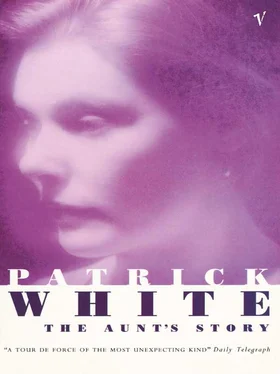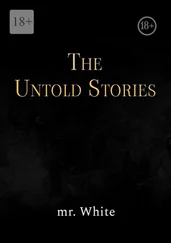It was both desolate and soothing to sit on the black hill. There are certain landscapes in which you can see the bones of the earth. And this was one. You could touch your own bones, which is to come a little closer to truth. After the secrets and quotations, the whispers in the orchard at Spofforths’. Now the ghost of Violet Adams had begun to be expelled. She could not endure the bones and stones. Though Theodora bowed her head. It is still possible to love the ghost that has been exorcised. There remains the need.
On the whole Theodora felt older. At Spofforths’ she felt older anyway, and particularly when the letter from Violet came. Violet had found time between keeping house and doing the flowers.
Violet had a talent for writing. She could compose.
Dearest Theodora,
I wonder how you all are, but you especially, I do sincerely wonder! That will remain, I know, the happiest time of my life , that I shall cherish and remember! Not that my present existence hasn’t its own interesting side. I feel that I am making my own small contribution in helping dear Mother. But it lacks the finer things, dear Theodora, that I found with you. It is without aspiration ! When I walk beside our big river, which runs some two hundred yds from the house, and which is now in flood, I like to remember our conversations. It is curious the connection between nature and life, and how one sustains the other!
I still contrive to read in an endeavour to improve myself.
I read poetry, and I am studying painting. I have even ventured to paint our river, but in gentler mood, before it was in flood, and friends have congratulated me on the veracity of my rendering. But I am not deceived! I wonder if you will ever write the poem, Theodora, you once said you would like to write. Do you know that very often you seemed to me a closed book ! I wonder what you will do!
Now I must stop because the men are coming in from work and will expect their tea. They eat like wolves! We have three jackeroos at present, one of them a Charlie Simpson, who is a second cousin of Lottie Littlejohn! He is a cheery fellow, full of fun, and excuse me this frivolity , he is excellent in a waltz!
Please do give my love to Fanny, and Grace, and Una, and Lottie, and, in fact, everyone at Spofforths’, but you of course, dear Theodora, will always retain the major portion of the affections
Of your sincere friend
Violet Adams
‘Theodora has a letter,’ said Una Russell.
‘It is from Violet Adams,’ said Theodora. ‘She sends you all her love.’
She held the corner on the candle. She watched the paper curl.
‘Won’t you give it us to read?’ cried Una.
‘There is no need,’ said Theodora.
She watched the paper curl and flame, and it was for the burning of flesh that she winced.
‘Oh, it was one of those letters,’ said Una Russell, and she shook her bangles, because she hated Theodora still, she hated what was unexplained.
‘Violet Adams was a little insipid poor thing,’ Una Russell said.
She could not watch Theodora enough, whose face was as yellow as a candle, but candlelight does not reveal.
Theodora burned the letter because it was both like and unlike Violet Adams. It was after all the letter that you would expect Violet to write, telling nothing at all. I wonder what it was, said Theodora, after the candles had been snuffed, what it was that I saw in Violet Adams. She decided that she would not think about the letter, but it kept recurring, like something she had done herself.
‘I wonder what you will do?’ Violet Adams had said.
And again, ‘You will be leaving soon, Theodora. I wonder if you have thought about the future,’ Miss Spofforth asked.
Theodora had gone into Miss Spofforth’s dark room, the Study it was called, to take the book for which Miss Spofforth had sent. She had not bargained for this. Now she was caught in the wide spaces between the bookcase and the fire, becalmed in her own silence and uncertainty. Fire fell from the logs into the winter afternoon, but did not warm. A cold laurel pressed against the window out of the winter wind.
‘Have you thought how you can live most profitably?’ Miss Spofforth asked.
And the dark square of her face struggled to open. She very much wanted to communicate.
‘No,’ said Theodora. ‘I shall go home, for the present. I shall live — well, as I have always lived.’
Because living was still something that happened in spite of yourself. She did not really believe, as apparently Miss Spofforth did, that you could turn living to profit.
‘There is a great deal that happens,’ she said.
‘I am sure,’ Miss Spofforth agreed.
She watched Theodora’s hands move as if they were about to reach out and touch something.
‘And provided one is happy, it does not much matter where,’ Miss Spofforth said.
Miss Spofforth had made her own happiness, solid and unmoved as mahogany, and Miss Spofforth was unpleased. She listened to the rooms of the house around her, which was her solidly founded, profitable happiness, but the rooms did not communicate. And outside, the leaf of the cold laurel was stroking space. But this is ridiculous, Miss Spofforth said.
‘I expect you will also marry,’ she said, with the bright smile she offered to parents of backward or headstrong children. ‘Most of the girls do.’
‘I had not thought about it,’ Theodora said.
She did not want this thrust at her. She did not believe in it very strongly, nor in Miss Spofforth’s bright smile, which did not fit her face.
‘That may be. You are not that kind of girl,’ Miss Spofforth said.
And she sighed. Because she would have offered this girl her wisdom and her kindness, of which really Miss Spofforth had much. She would have touched her hand and said: Theodora, I shall tell you the truth. Probably you will never marry. We are not the kind. You will not say the things they want to hear, flattering their vanity and their strength, because you will not know how, instinctively, and because it would not flatter you . But there is much that you will experience. You will see clearly, beyond the bone. You will grow up probably ugly, and walk through life in sensible shoes. Because you are honest, and because you are barren, you will be both honoured and despised. You will never make a statue, nor write a poem. Although you will be torn by all the agonies of music, you are not creative. You have not the artist’s vanity, which is moved finally to express itself in its objects. But there will be moments of passing affection, through which the opaque world will become transparent, and of such a moment you will be able to say — my dear child.
All these things would have been said by Miss Spofforth if they had struggled out of her squat body and her heavy face. Instead she opened the book and murmured, ‘Well, that will be all, Theodora.’
‘Thank you, Miss Spofforth,’ Theodora said.
There was no reason to remain, except to extract the most from a sense of warmth. The fire had settled now, she noticed. She looked curiously at the face above the open book, and left.
WHEN Theodora returned home, and Fanny followed, after a term or two, this was the beginning of a fresh phase at Meroã. It became the home of the Goodman girls, and people spoke of it in this sense. It was no longer a low, flat, sprawling yellow house, seen against dead trees, a mass of stone that the past had heaved up, much as the hills round Meroã had heaved out their black volcanic rock, and closed, and the rock remained, dead, suggestive but dead. This was no longer Meroã. When the Goodman girls returned home, at once the place had a future, you felt. People looked at the house from the road, from their drays, carts, sulkies, buggies, and sociables, going to town. People looked to see whether the chairs were filled or not with morning gowns, or whether a group in the rose garden at the side might be credited with an interesting situation. Actually the house at Meroã, even now, did not give many clues, but this did not discourage the sideways glance. To see whether the Goodman girls. Or Miss Fanny, rather. It amounted to Miss Fanny. Though Miss Theo has a good heart, Mrs Stepper said. But sort of sawny. So it amounted to Miss Fanny Goodman, who bought a ribbon at Spurgeon’s and said: I am at my wit’s end, whether to take the shell-pink or the rose, you, Mr Spurgeon, must help me choose. It kind of made you feel you revolved. And Meroã, to which they turned their eyes from the road, from their drays, carts, sulkies, buggies, and sociables, this was the centre, because it had Fanny Goodman in it.
Читать дальше












